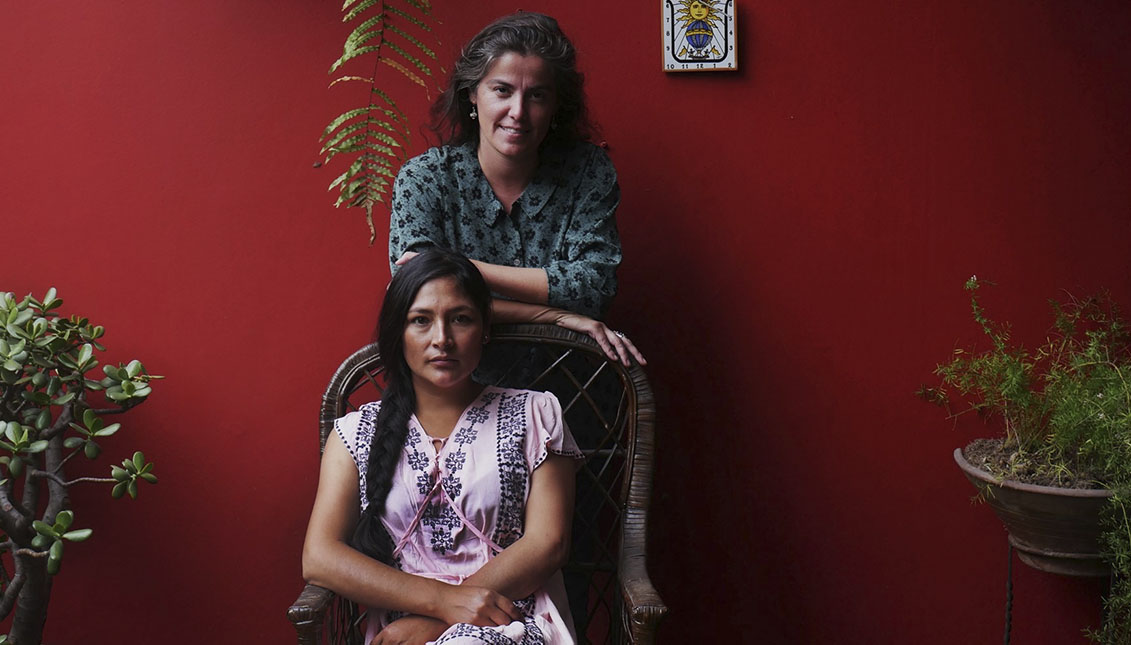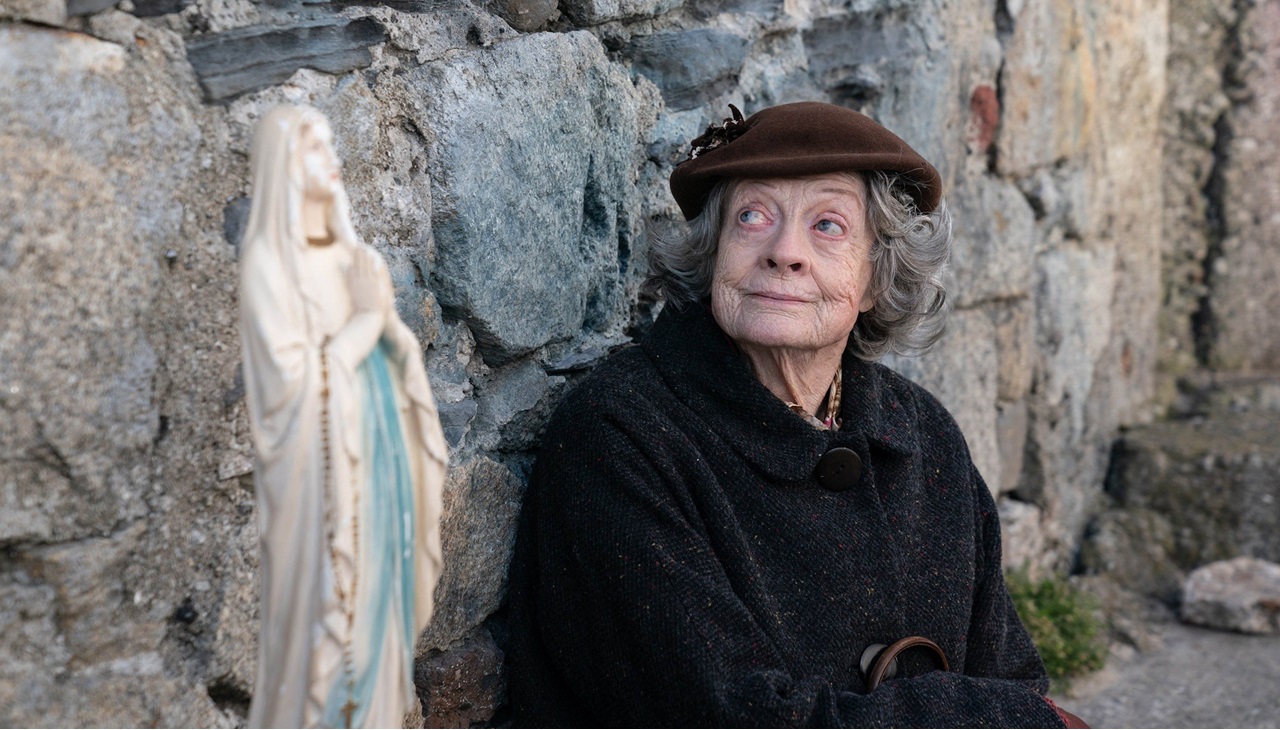
Lina from Lima: Why cinema should not continue victimizing migrants
In "Lina de Lima" (2019), Chilean director María Paz González tells the story of a Peruvian domestic worker in Chile in the style of a musical comedy.
When Lina discovers she is alone and nobody needs her in her native Peru, a new world of possibilities opens for the domestic worker as a migrant in Chile. Far from her land, but grounded in her culture, she awakens a sexuality where men, and not just women, can be treated as objects of desire.
This is just one of the themes of the hilarious, tender and luminous "Lina From Lima," a musical comedy by filmmaker María Paz González that, since its premiere last year, has been applauded by critics and audiences alike. The praise is for singing loud and clear that the migration experience is not only made up of harshness and precariousness, but also embodied in courageous, powerful and unique protagonists.
AL DÍA had the chance to interview González director we to talk migration, identity, strong women themes in movies and the importance of Latina filmmakers like her.
The film was born out of an investigation in which I immersed myself in the reality of many migrant women. What I found was a world of strong, funny and luminous women who also find, in the distance, and perhaps for the first time, a space of their own where they can see themselves. For me, it was very important to rescue that energy to give life to a multifaceted female character. A character who, in fact, carries the economic weight and the emotional deficiencies that living and working outside her country gives her, but who is also an empowered, determined woman willing to get what she wants.
During the process, I watched many films about migration and yes, I found that the victimization of the characters is almost a feature of migrant plots. It is very difficult to be a migrant, but people who are migrants often have a special strength that is unique. In my research, I didn't encounter the dark and silent characters of migrant films, but rather, a colorful world of women who are empowered and fun, but also full of contradictions.
I would say that full-time domestic work is something exclusive to the Chilean upper class. It's expensive and very demanding. The middle or wealthy class relies on domestic work by women who work for hours or half days and spend the week moving from one place to another to earn a salary. It is a very unprotected world where women, who are often migrants, take care of children. They are valued for their ability to speak well, sometimes for their university studies, and for their time and experience with children, since many are mothers who have left their children in their countries of origin. Many of the migrant women who arrive in Chile leave as domestic workers, although over time they find other jobs where they have more freedom and can better organize their schedules.

It's not the only one, but it's usually something very relevant, I feel. When you think about the place of origin, memory usually brings back songs, textures and smells. That's why food is also a very powerful source of identity. I am a great admirer of Peruvian culture. I admire the connection that Peruvians have with their culture and the weight they give to food, music, and dance. The connection that it has with the landscape, with the language and with the roots is very powerful. For the film, I researched Peruvian music a lot and we worked from rhythms that come from different regions of Peru. We invented lyrics and brought the inner world of Lina to life. It was a very nice process of connecting with a deep culture that is very rooted in those who live far away.
It's very difficult! I hadn't even made a music video. My team had a lot of experience in fiction shoots and I really trusted them to launch us. There were two complexities: On the one hand, creating the songs was a beautiful collective work that we did with Cali Flores, a Peruvian composer and musician, José Manuel Gatica, a Chilean composer, Magaly Solier and myself. Each of us contributed and we added ideas in different stages of the process. I learned a lot.
On the other hand, there was very complex technical work that we were weighing of during post-production. There, the contribution of Sofía Straface was very important, the Argentinean sound designer who worked hard so the music would take shape within the film.
Complex, but it was very nice.
For me, Lina is a woman who has spent much of her life working for the desires and needs of another — her mother, her son, her former partner. Sexuality represents a space that complicates her relationship with herself. Pleasure, enjoyment, is something that goes beyond what is expected from a self-sacrificing mother. It is something that confronts her with guilt. It is a kind of antagonist. It's something that the character seems to choose to pursue herself.
I find it interesting to think about the sexuality of a migrant woman. Thinking about that freedom she can imagine far from home — a transitory and clumsy freedom, but freedom at last. I'm also interested in the possibility of reversing roles and imagining, from Lina's subjectivity, man as an object of desire.
Absolutely, I have no doubt about that. I think that women usually look at the world from a place that is displaced from the center. I imagine directors (usually white and Western), looking at the world from the top of a pyramid, while we are scattered around in different points of a circle. From there, we look at a violent pyramidal structure that is slowly falling. Woman's look seems to me much freer, more complex and necessary to think about the new times.

RELATED CONTENT
I'm very excited because it was approved that the new Constitution in Chile will be drawn up for the first time in the world, on an equal basis. This is not a whim. More than half of the world are women, who have been underrepresented in every possible field throughout history. I think we have to find a way to radically reverse that.
Films directed by women give us access to new ways of looking at the world and I think it is urgent to make it visible. For me, it all adds up to women's festivals and quotas. Now, what I do think we have to stop seeing it as a kind of invasion, and see it more as an opportunity to refresh and free ourselves a little from a hegemonic viewpoint that makes less and less sense.
I don't think it is a obsession. Although, my next movie also has a journey.
I'm very interested in the genres that are looked at, perhaps from some possible periphery. "Daughter" was a road movie, "Lina from Lima" has a musical spirit and the one I'm writing now tries to play with thriller. What attracts me to these genres is that they allow us to revisit common places. I'm also interested in humor interacting with drama. I feel that deep spaces are generated in which we can have dialogue with the audience. A humor that is not a joke, but one that is based on empathy with some common experience.
I'm also very interested in the dialogue between documentary and fiction, not only from a formal point of view, but also from the point of view of how this relationship allows us to exploit the human condition. How our identity, our beliefs, and our memory can be only a sum of fiction.

I find the Argentinean Lucrecia Martel and Albertina Carri very inspiring. They are very different, but I think there is a freedom in their work that I admire a lot.
I'm also interested in the first works of Latin American directors. I think there is a world out there to be discovered. Many powerful and diverse female gazes that open up very new ways of looking at what surrounds us.
I'm now working on a new fiction called "Morir de Pie" (To Die on My Feet), which stars a young actress who works as a simulated patient in a hospital — a woman who is very good at playing emotions in her work but very elusive in living hers. That is until life somehow demands that she take care of a father she doesn't know and dies in strange circumstances.
It's a film that is in the development stage and I'm writing it with Chilean Alejandra Moffat. We are still getting to know the character and enjoying the process.











LEAVE A COMMENT:
Join the discussion! Leave a comment.